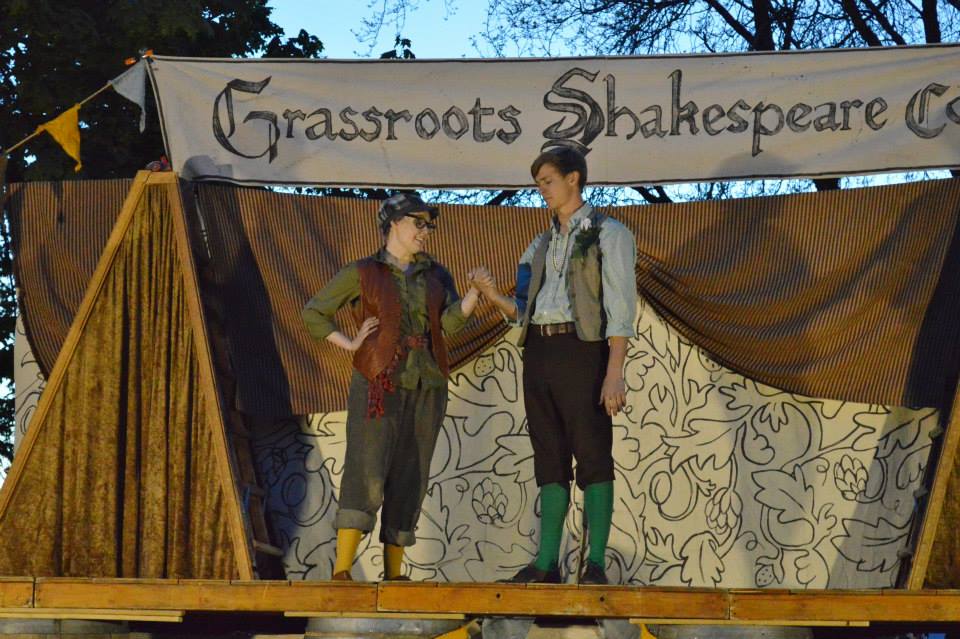PROVO — If I had to choose one word to describe the Grassroots Shakespeare Company production of As You Like It, it would be “energetic.” Nearly every scene of the play is energetic and fun. There is no inkling in this show of a mopey Orlando, a subdued Celia, or a subtle Sylvius. I don’t know whether the final product is what Shakespeare intended, but the product is a play that will smash any preconceived notions of Shakespeare’s work as being staid or dull.

Orlando is a young man banished from the court of Duke Frederick by his brother, Oliver. Orlando seeks refuge from his family problems in the Forest of Arden, just as his new-found love interest Rosalind and her cousin Celia do the same. This being a Shakespeare comedy, Rosalind disguises herself as a male page named Ganymede. However, when Rosalind meets Orlando her disguise becomes a barrier to their love.
Because Grassroots Shakespeare Company has no director or designers, it is one of the most actor-centered theatre companies in the state. Therefore, the success of any production almost completely rests on the actors’ shoulders. As Orlando, Brooks Lindberg has embraced the basic affable nature of his character, and it’s easy to empathize with Orlando’s exile and the way Rosalind spurns him when she is disguised as Ganymede. Playing opposite Lindberg is Jessica Myer as Rosalind. Myer’s interactions with Charlotte Martell Andrews (playing Celia) were natural and familiar, which made me easily believe that the two characters were relatives and longtime friends. However, I wish the chemistry between Myer and Lindberg were more prominent. Orlando and Rosalind have precious little time on stage together when Rosalind isn’t disguised; because the actors did not make their characters’ emotions for each other very clear during these moments, their eventual marriage felt contrived.

Yet, there were several duos among the As You Like It cast that function well, in addition to the previously mentioned Rosalind and Celia. Kailey Azure Green as Audrey and Steven Pond as Touchstone were a pleasure to watch as Green’s simplicity and naivety meshed well with Touchstone’s foolish ways. I enjoyed watching how Touchstone wooed the simple country girl and made himself seem more sophisticated than he actually was. Another charming pair of actors consisted of Daniel Fenton Anderson as Sylvius and Alexandra Russell as Phebe; the two made each character’s attitude toward the other unambiguous, which freed them to fully exploit the abundant humor within their scenes.
Finally, I also enjoyed Dominic Zappala‘s portrayal as Oliver, Orlando’s older brother. Because Zappala chose to make his character less cartoony than Duke Frederick (played by Dallin Halls), Oliver became more human than what I have seen in other productions. I also enjoyed Zappala’s changed demeanor after Oliver has his abrupt change of heart when Orlando saves his life. This softening of the character made me feel better than usual about his marriage at the end of the play.

But speaking of individual actors’ performances in a Grassroots production can be myopic. What is notable is how the entire As You Like It company behaves as an ensemble. The entire company understands not only the meaning of Shakespeare’s words, but also why he chose the words he did. The cast knew, for example, to imbue sarcasm into Orlando’s bad poetry or how to maximize the humor in the witty repartee between Jaques (played by Addison Radle) and Orlando. As a consequence of the cast cohesion and uniform competence, the play has as much unity as most traditional director-helmed stagings of Shakespeare plays.
For longtime fans of Grassroots Shakespeare Company, there is plenty here that is familiar: the hodgepodge of costume pieces, the emphasis on audience participation, and the lean, efficient cuttings of the script. As You Like It strongly follows the formula that has worked well for almost every Grassroots show I’ve seen, and it succeeds again here. Like many Grassroots shows, As You Like It serves as a nice introduction to Shakespeare for newcomers while also providing Shakespeare experts with insights into Elizabethan performance through an innovative production. Indeed, when Jaques refers to “this wide and universal theatre,” it is easy to imagine that he could be discussing the appeal of a typical Grassroots production.
[box type=”shadow”]The Grassroots Shakespeare Company production of As You Like It plays at various locations in Utah, Salt Lake, Davis, Weber, and Grand Counties through July 12. Admission is free, but patrons are encouraged to make a $3 donation. For more information, visit www.grassrootsshakespeare.com.[/box]
